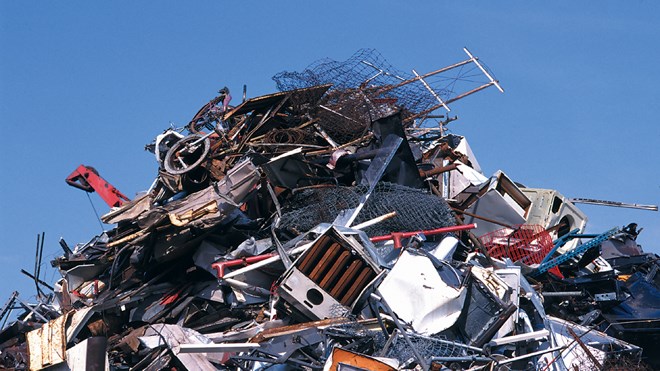There will be a lot of trash talking going on at city hall next week, as councillors will be reviewing a report with options for major changes in the way the city picks up garbage.
A report going to the operations committee Monday says the motivation to change current policies is largely driven by the need to extend the lifespan of current municipal landfills.
“Planning and establishing a new landfill site or disposal facility is a very long, difficult and expensive process,” the report says. “We want to delay this process for as long as we can. The more that we delay ... the less we’ll have to start setting aside for a new site. A new site is currently estimated at $40 to $50 million.”
The best way to extend the lifespan of city dumps is by increasing the amount of waste that's diverted to recycling and composting. And the best way to do that is to reduce either the frequency of garbage pickup or the amount of garbage people can throw out each week.
“The City of Kingston changed from a two-bag weekly limit to a one-bag limit to encourage better participation in the green bin program and increase their diversion rate,” the report says. “By reducing garbage bag limits, (Kingston) experienced three per cent less garbage collected and a 13-per-cent increase in green bin materials collected.”
In Ottawa and Barrie, reducing collection from weekly to twice a month reduced the amount of garbage headed to landfills by an average of 15 per cent. In Durham, reducing the bag limit to two and reducing collection to twice a month resulted in a reduction of 27 per cent less garbage headed to landfills and a 67-per-cent increase in home composting.
However, in Owen Sound, reducing the frequency of garbage pickup led to an increase early on in the process in the number of people dumping household garbage in city-owned containers in public areas.
Reducing the bag limit is regarded as the best way to increase the amount of waste that is recycled or composted, the report says. Almost 90 per cent of homes already throw out less than three bags a week, the report said, while 9.7 per cent throw out three and 1.3 per cent throw out more than three.
“A change in the garbage bag limit is also expected to influence the homes that currently generate two bags or less,” the report says. The change would be well advertised and would promote additional diversion and recycling.
“The education would include the fact that although we are doing well, we can do better. This is based on waste audits conducted that indicated that approximately 46 per cent of the waste placed in a garbage bag could actually be diverted or recycled.”
So even homes that only produce two bags of garbage a week could probably throw out even less, the report says.
Reducing the frequency of garbage pickup two twice a month would be a major factor in encouraging people to compost. The report says much of the smell of garbage comes from food and other organic waste, a problem that would be solved if residents composted that waste.
“Based on the experience of a few municipalities, waste diversion is expected to increase by approximately 3,400 tonnes per year, with the majority in organic diversion,” the report says.
And depending on what changes the city decides to implement, cost savings could be significant.
“Savings for Greater Sudbury could range from approximately $370,000 to $900,000 per year,” the report says.
While the changes are being implemented, the report suggests that the fees for big recylcing and green cart containers be waived to make it easier for residents to transition to the new rules.
And allowances should be made for families that can't easily adapt to reduced garbage limits.
“For example, young families with more than two children under the age of three or families with home health care individuals may need special consideration,” the report says.
City staff could consult with the families to outline options on how to reduce their weekly garbage. Or homes that have been approved and registered with the city could throw out more waste using clear plastic bags to ensure they're not throwing away recyclable material.
Members of the operations committee will have four options to choose from: maintain the status quo, reduce the bag limit in 2017, reduce the frequency of pickup in 2019, or reduce both the frequency and the bag limit, also effective in 2019.
The committee will review the report at Monday's operations committee meeting.
Join Sudbury.com+
- Messages
- Post a Listing
- Your Listings
- Your Profile
- Your Subscriptions
- Your Likes
- Your Business
- Support Local News
- Payment History
Sudbury.com+ members
Already a +member?
Not a +member?
Sign up for a Sudbury.com+ account for instant access to upcoming contests, local offers, auctions and so much more.
